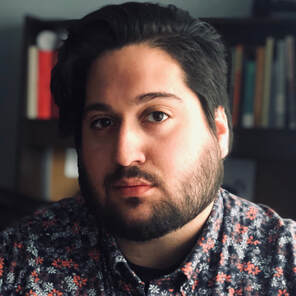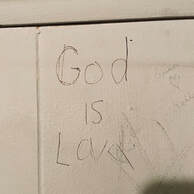|
INTERVIEWED BY SOPHIA LIU Steven Espada Dawson is from East Los Angeles and lives in Madison, Wisconsin, where he is the Jay C. and Ruth Halls Fellow in Poetry at the Wisconsin Institute for Creative Writing. The son of a Mexican immigrant, he is a 2021 Ruth Lilly and Dorothy Sargent Rosenberg Fellow. His poems appear/appear soon in AGNI, Guernica, Poetry, and the Best New Poets and Pushcart Prize anthologies. I’m in awe of so many of the metaphors in your pieces. I remember reading “What I Hate Most About Mom” for the first time and being stunned by the lines “I see death everywhere. / A banana left / to the sun is a bat’s / cadaver.” What’s your process like for finding and crafting comparisons? I wrote that poem at a moment in my life of terrible negativity bias. When my speaker says, "I see death everywhere," it's because I saw death everywhere. The poet William Matthews writes, "I'm in these poems / because I'm in my life," and that rings loud and close for me. "What I Hate Most About Mom" was built around that bat image, actually. It's a real thing I witnessed. I remember seeing a banana peel someone threw on the ground in the parking lot outside my apartment. For whatever reason I didn't pick it up and went on to lock myself inside for a couple days. When I went out again it startled me. It was black and shriveled and very bat-like to me. I think our involuntary responses to images tell us a lot about how we're feeling. It's a kind of value-neutral alchemy where the world helps us understand ourselves better. I think I'm really no more witness to the world than any other creative person. What I will say is that I'm really good at stopping what I'm doing and writing things down. Sometimes I'm too good: interrupting conversations and phone calls. My friends are not huge fans of this approach. Yes, I relate to that so much! Being a writer is so much more than the act of writing—it’s also observing and irking your friends. Where are you recently turning to for inspiration? Thank you for that question. I haven’t been reading much of anything these last couple weeks, as I’m currently moving across the country. I did recently discover the work of Jay Hopler, and it's been keeping me afloat in all this uprooting. I feel like his work asks you to pinky swear with uncertainty in a way I haven't read exactly before. That gesture is a huge comfort to me right now. Here's the poem that initially got me hooked: "self-portrait not looking" (originally posted on Twitter by Brian Tierney). Aside from that, I've had the pleasure of seeing a lot of bathroom graffiti at truck stops on this 20 hour drive. It's tough to pick a favorite, but there was one on the bathroom wall of John's Food Center in Topeka, Kansas that really got me. Someone wrote "God is Love," and another person carved some additions, turning it into "God is Lava." Thank you for recommending that piece, it has such meticulous wordplay. In the same vein, every one of your poems also feels so carefully and thoughtfully crafted. Can you talk about how much time you spend on a piece, how you know it’s finished, and how you decide it’s ready to submit to publications?
I spend a lot more time "preparing" to write than I do actually writing. I'm diligent about archiving what I observe/experience, and that makes the actual writing process easier. I also daydream a lot about what any particular poem is going to look like on the page, so when it finally happens I've got a shape and line breaks in mind. Sometimes it feels like drawing a picture from memory. Then, I'll sit down at my laptop or my phone. (Side note: I wish I was cool enough to hand write my poems for cool-mysterious-poet points, but my handwriting is terrible.) The writing process might take a single draft or twenty after that. The poem you referenced earlier, "What I Hate Most About Mom," was written in 15-minutes in the bathroom of Major Restaurant in Indianapolis. A poem with similar themes, "Elegy for the Four Chambers of My Mother's Heart," took a couple years of drafts to get right--and I'm still not totally convinced. I'm finished with a poem when I feel like I can't learn anything from it anymore. Publishing is a byproduct I'm thankful for, but I write more to learn about myself, how I'm feeling, how I want to feel; if others find the poems helpful in learning about themselves, that's a huge bonus, and I'm grateful for their reading. When a poem has taught me what it can, it's "finished." Something that has taken a lot of pressure off of me is the realization that any particular poem might have multiple lives. A poem you wrote three years ago but never pushed on might find you while shuffling through your notes. It might turn into a brand new thing with wings, might be the centerpiece of your new collection. A poem you got published in a journal might look totally different in your book. Different title, form, ending. Might look a little different in an anthology down the road. Anyway, I don't think a poem is a fixed artifact, and that realization has helped me set more poems down, pick new ones up. No way, 15 minutes! I could think about the last lines for hours. That’s such a beautiful way to put revision. I’m thinking of what Ocean Vuong said in Lit Hub— “The poem is like a tree, and the book is a photograph of the tree. You take a photograph of the tree, but the next day, the tree has new cells. The next year, it has new branches. We have to make peace with the fact that a book is actually just a photo album, and that the organic psychic life of the poem is already growing somewhere else, somewhere inside you. And we pin it down.” I think you’ve pinned down your elegy series—“Elegy for the Four Chambers of My Heart/My Mother’s Heart/My Brother’s Heart”—so well. How does each elegy evolve from or interact with one another? Are you currently writing more elegies? I love that quote from Vuong, woah. Book as a photo album!! Thank you for sharing that. I've always been drawn to elegies. I think writing them teaches us the details of our love for someone. That idea of "love" can get really vague sometimes, so abstract in its own hugeness, and writing elegies can force you to point at the specific, not the boundaries of some idea. I've been thinking about writing another "Elegy for the Four Chambers..." poem for my biological father who was never in the picture. I think it'd have to be an erasure poem because of that, and I haven't found exactly the right text that needs to be erased. The series you point to was especially difficult to get down because of the circumstances each elegy orbits. My brother really is/was an addict who disappeared suddenly 13 years ago. My mom really is at the end of her beautiful and difficult life. As someone who often struggles to manage depression and suicidal ideation, I sometimes feel at the end of my own life. I'm writing these elegies for people that exist at the fringes of their living. In this space, the poems feel like both levies and testimonies. Something to build up, to prepare for the grieving to come. Something that helps me understand the value of what will be lost. You teach writing for the Austin Library Foundation, Austin's Youth Poet Laureate Program, and Ellipsis Writing! What’s your best piece of writing advice? I'm lucky to work with a ton of incredible writers. Seriously, my students inspire me to write more than books do. I find that a lot of my students, though, are writing specifically to publish their work/submit to contests/etc. This is one of myriad weird ways capitalism has t-boned art for many people. It's become just another talent for people to prove their academic worthiness or something. I've been there--and in some ways I still am--and I respect the hustle, really. But I think that forced mentality is a good way to keep writing the same poems over and over. It's an easy way to plateau your craft and, more importantly, the figuring out you're doing every time you write. I think, if they can do it safely, new writers should write towards discomfort. Take risks with your work while you're still chisling out your voice. When you eventually publish at your favorite places, that extra work will be well taken by readers. You mentioned in The Rumpus that you’re finishing a manuscript. Can you tell us more? I'm in the final stages of my first full-length collection, tentatively titled Elegy, Pending. It's a book about a lot of things but primarily a family caught in the liminal space just before death. I'm currently at work on the last poem (fingers crossed) that the book needs to feel like itself. I'll be spending the next nine months as a poetry fellow at the University of Wisconsin - Madison, where I plan to finish this collection, work my way into a second, and begin a super-secret nonfiction project I've been daydreaming into existence.
0 Comments
Leave a Reply. |
Archives
April 2023
Artists
All
|

